AG Steve Marshall applauds Supreme Court ruling upholding Christian web designer’s right to deny service to a gay wedding
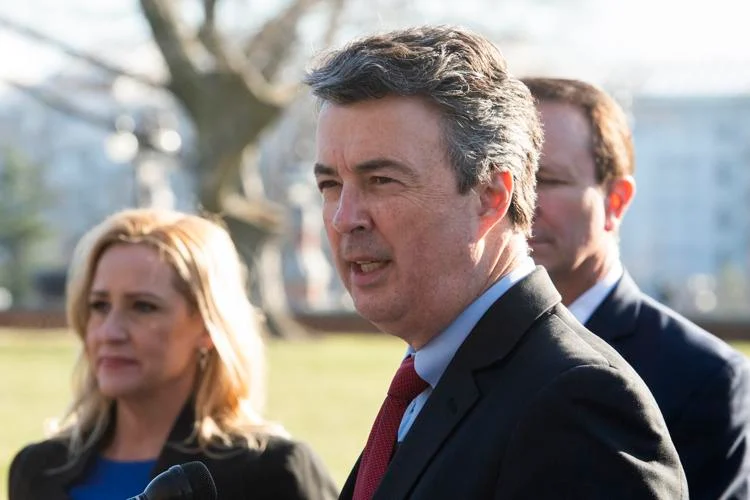
On Friday, Alabama Attorney General Steve Marshall welcomed a 6 to 3 U.S. Supreme Court ruling that protects a Denver area Christian web designer’ from having to build a website for a gay couple’s same-sex wedding in violation of her Christian principles and beliefs. 303 Creative and its owner, Lorie Smith, is a graphic artist and website designer in Colorado. Smith expanded her business into wedding website design. Smith’s deeply held Christian beliefs prohibit her from promoting same-sex weddings. Colorado’s anti-discrimination law forbids businesses from denying service to LGBTQ+ persons seeking service. Under that law, if Smith designed and promoted custom websites for opposite-sex weddings, she would have to design and promote custom websites for same-sex weddings too. Smith filed a suit claiming that the law violated her First Amendment rights to practice her religion and her free speech rights and that the Colorado law as such is a blatant violation of the Bill of Rights. The lower court ruled against her. Undeterred, Smith appealed to the Tenth Circuit Court of Appeals, which also ruled against Smith, and then appealed to the Supreme Court. The Supreme Court’s opinion in 303 Creative v. Elenis reaffirms that the First Amendment prohibits the government from forcing citizens, including business owners, from speaking messages with which they disagree. In the 6-3 opinion, the Supreme Court reversed the Tenth Circuit Court of Appeals decision against Smith. “The Constitution and our First Amendment prevail,” Marshall said in a statement. “All Americans enjoy the right to freedom of conscience, and that freedom means the government cannot coerce anyone to speak against their deeply held beliefs,” said Attorney General Marshall. “Today’s decision confirms that state and local government are not ‘immune to the demands of the Constitution.’” In June 2022, Attorney General Marshall signed on to a 20-state amicus brief urging the Supreme Court to protect the First Amendment rights of business owners. The brief argued in support of Smith. Liberty Counsel, a nonprofit legal advocacy group that defends religious liberty, also filed an amicus brief in favor of the web designer’s right to deny service. Liberty Counsel said in a statement that the Colorado state law censors and coerces the speech of creative professionals whose religious beliefs do not conform to state-accepted beliefs. Liberty Counsel Founder and Chairman Mat Staver said, “This is a great victory for the right of individual speech and expression. The state cannot force people to convey a government-approved message against their religious beliefs or individual choice. Film, theater, art, and other creative expression would not exist if the government could censor the message.” Justice Neil Gorsuch wrote the opinion, which was joined by Chief Justice John Roberts, and Justices Samuel Alito, Clarence Thomas, Brett Kavanaugh, and Amy Coney Barrett. The three liberal Justices, Sonia Sotomayor, Elena Kagan, and Kentanji Brown Jackson, dissented. “The First Amendment protects an individual’s right to speak his mind regardless of whether the government considers his speech sensible and well-intentioned or deeply ‘misguided,’ and likely to cause ‘anguish’ or ‘incalculable grief.’ Equally, the First Amendment protects acts of expressive association,” Justice Gorsuch wrote. “Generally, too, the government may not compel a person to speak its own preferred messages. Nor does it matter whether the government seeks to compel a person to speak its message when he would prefer to remain silent or to force an individual to include other ideas with his own speech that he would prefer not to include. All that offends the First Amendment just the same.” “Applying these principles to this case, we align ourselves with much of the Tenth Circuit’s analysis,” Gorsuch continued. “The Tenth Circuit held that the wedding websites Ms. Smith seeks to create qualify as ‘pure speech’ under this Court’s precedents. We agree. It is a conclusion that flows directly from the parties’ stipulations. They have stipulated that Ms. Smith’s websites promise to contain ‘images, words, symbols, and other modes of expression.’ They have stipulated that every website will be her ‘original, customized’ creation. And they have stipulated that Ms. Smith will create these websites to communicate ideas—namely, to ‘celebrate and promote the couple’s wedding and unique love story’ and to ‘celebrate and promote’ what Ms. Smith understands to be a true marriage. We part ways with the Tenth Circuit only when it comes to the legal conclusions that follow. While that court thought Colorado could compel speech from Ms. Smith consistent with the Constitution, our First Amendment precedents laid out above teach otherwise.” “Nor is it any answer, as the Tenth Circuit seemed to suppose, that Ms. Smith’s services are ‘unique,’” Gorsuch continued. “In some sense, of course, her voice is unique; so is everyone’s. But that hardly means a State may coopt an individual’s voice for its own purposes.” “The First Amendment extends to all persons engaged in expressive conduct, including those who seek profit (such as speechwriters, artists, and website designers),” Gorsuch wrote. If anything is truly dispiriting here, it is the dissent’s failure to take seriously this Court’s enduring commitment to protecting the speech rights of all comers, no matter how controversial—or even repugnant—many may find the message at hand.” Justice Sotomayor wrote the dissent. “Today, the Court, for the first time in its history, grants a business open to the public a constitutional right to refuse to serve members of a protected class,” Sotomayor wrote. “New forms of inclusion have been met with reactionary exclusion. This is heartbreaking. Sadly, it is also familiar. When the civil rights and women’s rights movements sought equality in public life, some public establishments refused. Some even claimed, based on sincere religious beliefs, constitutional rights to discriminate. The brave Justices who once sat on this Court decisively rejected those claims.” The last day of Pride Month perhaps ironically ends with a Supreme Court ruling affirming that LGBTQ+ rights do not mean that the state can deprive other citizens of their free speech and religious liberty rights. The Human Rights Campaign (HRC) released a statement denouncing the decision. “This decision by the Supreme Court is a dangerous step backward, giving some businesses the power to
Supreme Court rules that Joe Biden’s executive order forgiving student loan debt unconstitutional
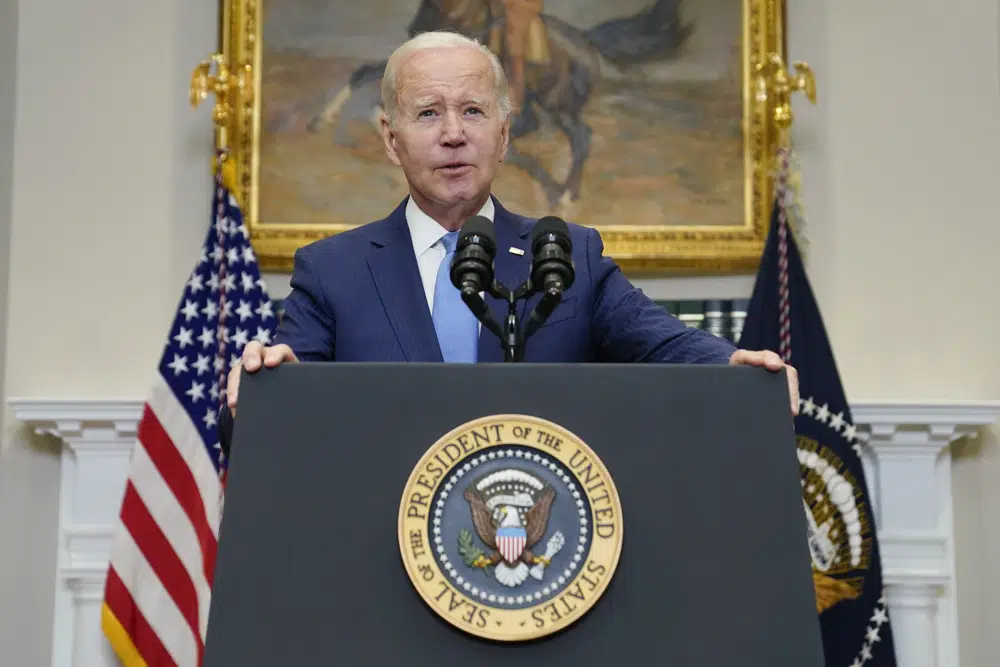
On Friday, the U.S. Supreme Court ruled that President Joe Biden’s controversial executive order to forgive millions of student loans exceeded the powers of the President as enumerated by the Constitution. The Biden administration had argued before the Court that it had acted lawfully as the COVID-19 global pandemic meant that the President had the unilateral right to cancel student loans as part of its emergency response. They also cited a 2003 law called the HEROES Act, passed during the Iraq War. The Court rejected the administration’s arguments in a 6-to-3 ruling Friday in Biden vs. Nebraska. Chief Justice John Roberts wrote, “The HEROES Act allows the secretary to ‘waive or modify’ existing statutory or regulatory provisions applicable to financial assistance programs under the Education Act, but does not allow the secretary to rewrite that statute to the extent of canceling $430 billion of student loan principal.” When President Biden was running for office in 2020, he promised student loan forgiveness to motivate young people to vote for him over then-incumbent President Donald Trump. Even though Democrats controlled both Houses of Congress for his first two years in power, Biden could not pass student loan forgiveness through Congress, so he opted for the legally dubious step of doing it by executive fiat. The Supreme Court, in Friday’s ruling, rejected that effort. Congresswoman Terri Sewell, a Biden loyalist, released a statement in response to the Supreme Court’s decision. “Today, the Supreme Court has chosen to side with Republican state officials who would rather score political points against President Biden than help hard-working Americans being crushed by student loan debt. To say that I am disappointed would be an understatement,” Rep. Sewell said. “In light of this terrible decision, I am calling on my colleagues in Congress to take action to combat the student debt crisis and make higher education more affordable for our students.” U.S. Senator Katie Britt voiced her support for the Court’s decision. “Hard work and personal responsibility are at the heart of the American Dream,” Britt said on Twitter. “As we knew all along, the Biden Administration’s student loan debt transfer scheme was unfair, unjust, and unlawful. I was proud to join @SenateGOP colleagues on an amicus brief in this important case.” Congressman Barry Moore also released a statement in support of the Supreme Court ruling. “The Supreme Court just declared Biden’s student loan giveaway unconstitutional,” Rep. Moore said on Twitter. “Huge victory for American taxpayers, who would have been forced to foot the bill of $400 billion over the next 30 years.” To connect with the author of this story or to comment, email brandonmreporter@gmail.com.
Minority Leader Anthony Daniels says Supreme Court decision threaten to roll back decades of progress
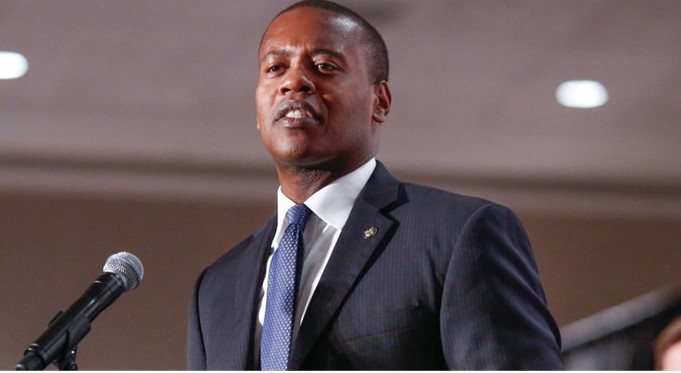
State Representative Anthony Daniels (D-Huntsville), Minority Leader of the Alabama House of Representatives, released a statement on the landmark Supreme Court decision in Students for Fair Admissions Inc. v. President and Fellows of Harvard College. Daniels said he was concerned that the decision threatened to overturn decades of progress in the country. “We are an increasingly diverse country that is still grappling with a legacy of racism and the resultant and ongoing disparities based upon race,” said Leader Daniels. “Rather than encourage solutions to address those disparities, the Court today deepened them. It also widened existing and growing political divisions.” “Today’s Supreme Court ruling pretends these racial disparities don’t exist, despite overwhelming evidence that shows they impact test scores, student achievement, and access to educational and economic opportunity for so many individuals and families,” Daniels continued. “The irony is that at least two members of the majority are the direct beneficiaries of affirmative action and related policies.” Daniels continued. “Justice [Amy] Coney Barrett attended a law school with gender balance, and Justice [Clarence] Thomas benefitted from Yale’s affirmative action program. The fact that they benefited from these or related policies to put them on the path to career success (and the highest court in the land) but now want to erect a roadblock for others is not only disappointing, but it’s also downright wrong.” Daniels continued, “We desperately wish they could connect their individual stories of advancement to the promises that our Constitution is supposed to uphold for all. Simply put: your success story is not only a matter of where you came from. It’s also a matter of how you got there. This decision is deeply disappointing and terribly cynical. It threatens to roll back decades of progress in our educational institutions and our society. Sadly, it also reveals what some of us have long known – many qualified and privileged Americans either can’t or won’t recognize the opportunities afforded to them along the way.” “Furthermore, the majority opinion actually reveals that arguments for Affirmative Action must have some merit as it exempts military academies from the ban that it’s unilaterally applying to the rest of America,” said Daniels. “In the words of Justice Ketanji Brown Jackson, “The Court has come to rest on the bottom-line conclusion that racial diversity in higher education is only worth potentially preserving insofar as it might be needed to prepare Black Americans and other underrepresented minorities for success in the bunker, not the boardroom (a particularly awkward place to land, in light of the history the majority opts to ignore).” “Race is a fact of life in America,” concluded Daniels. “Again, as Justice Brown Jackson wrote, “Deeming race irrelevant in law does not make it so in life.” This decision means that educational institutions will now have to work harder to reflect the diversity of our country and the unifying values of equality and fairness that can never be taken for granted. And it’s up to us to help them do it.” Harvard Dean David N. Hempton responded to the news the Supreme Court had found against their admissions policy. Hempton wrote, “Today, the Supreme Court delivered its decision in Students for Fair Admissions v. President and Fellows of Harvard College. The Court held that Harvard College’s admissions system does not comply with the principles of the equal protection clause embodied in Title VI of the Civil Rights Act. The Court also ruled that colleges and universities may consider in admissions decisions “an applicant’s discussion of how race affected his or her life, be it through discrimination, inspiration, or otherwise.” We will certainly comply with the Court’s decision.” “Harvard must always be a place of opportunity, a place whose doors remain open to those to whom they had long been closed, a place where many will have the chance to live dreams their parents or grandparents could not have dreamed,” Hempton said. “For almost a decade, Harvard has vigorously defended an admissions system that, as two federal courts ruled, fully complied with longstanding precedent. In the weeks and months ahead, drawing on the talent and expertise of our Harvard community, we will determine how to preserve, consistent with the Court’s new precedent, our essential values.” “Harvard must always be a place of opportunity, a place whose doors remain open to those to whom they had long been closed, a place where many will have the chance to live dreams their parents or grandparents could not have dreamed,” Hempton stated. “For almost a decade, Harvard has vigorously defended an admissions system that, as two federal courts ruled, fully complied with longstanding precedent. In the weeks and months ahead, drawing on the talent and expertise of our Harvard community, we will determine how to preserve, consistent with the Court’s new precedent, our essential values.” Colleges and universities across this country will have to review their admissions policies to ensure that they comply with this ruling and are not discriminating on the basis of race. To connect with the author of this story or to comment, email brandonmreporter@gmail.com.
Terri Sewell hosts symposium on Shelby v. Holder
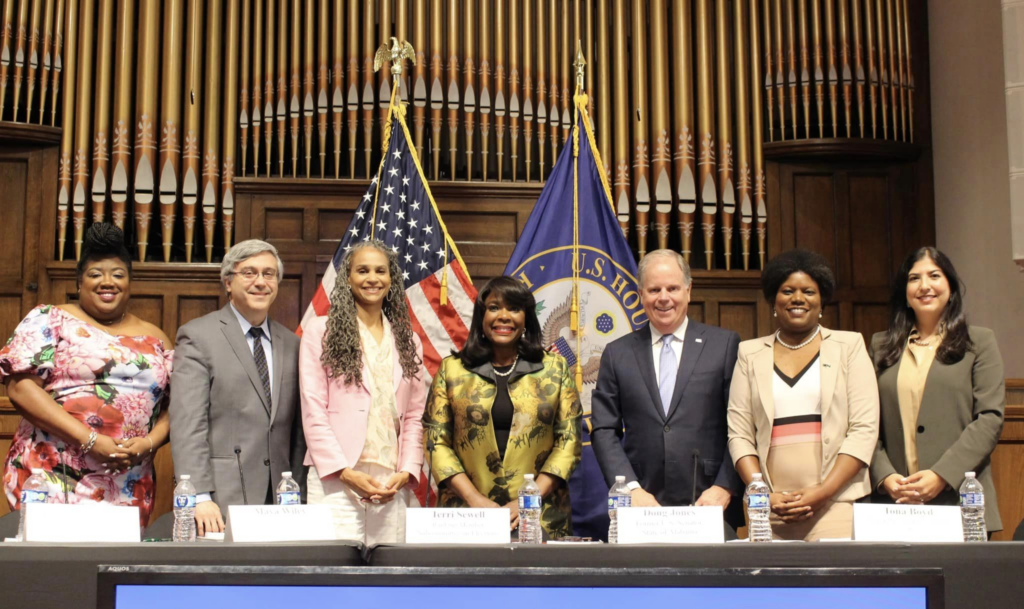
On Wednesday, Congresswoman Terri Sewell (D-AL07) led a symposium in Birmingham on the landmark Supreme Court ruling Shelby v. Holder that struck down the preclearance section of the Voting Rights Act 1965. “This morning, I convened some of our nation’s premiere civil rights and voting rights leaders at the 16th Street Baptist Church to commemorate the 10th anniversary of the Shelby County v. Holder decision which gutted the Voting Rights Act,” said Sewell on Facebook. “In the decade since the Shelby decision, one thing is clear—old battles have become new again as the right to vote has come under attack. But we in Alabama have seen this before and we’re not going down without a fight. The Foot Soldiers left us a blueprint to protect their progress and advance it. Drawing courage from their sacrifice, we will protect the right to vote in Alabama and across the country.” Sewell was joined on Wednesday by President & CEO of The Leadership Conference on Civil and Human Rights Maya Wiley, former U.S. Senator Doug Jones, the President & General Counsel of the Mexican Americans Legal Defense Fund (MALDEF) Thomas A. Saenz, the Associate Director-Counsel, NAACP Legal Defense Fund (LDF) Tona Boyd, Staff Attorney, Native American Rights Fund (NARF) Jacqueline De Leon, Birmingham Civil Rights Institute President & CEO DeJuana Thompson, the executive director of Alabama Forward Evan Milligan, the Co-Founder & Executive Director of Black Voters Matter Cliff Albright, the Vice President of Census & Voting Programs for Asian Americans Advancing Justice (AAJC) Terry A. Minnis, the Co-Director of the Voting Rights Project for Lawyers’ Committee for Civil Rights Under Law Marcia Johnson, and the Alabama Policy Director for the Southern Poverty Law Center Jerome Dees. “The Shelby decision was decided in 2013,” Sewell said. “It had tremendous ramifications. The disastrous decision in Shelby versus Holder gutted key provisions of the Voting Rights Act of 1965,” Sewell said. “The preclearance section stopped really restrictive voting laws before they went into effect.” “The Leadership Council on Civil and Human Rights is the lobbying arm of the civil rights movement,” President Wiley said. “Barack Obama won in 2008, and that was the beginning of the end of bipartisanship on voting rights.” “In 2006, George Bush supported, and very few members of Congress were willing to oppose, extending the Voting Rights Act,” Wiley said. “After Obama’s win, things changed. Instead of contesting for our votes, they made it harder for us to vote,” Wiley said. Sen. Jones said, “Terri has become, since the death of John Lewis, the champion of voting rights in the U.S. Congress.” Jones said that in the effort to make it harder to vote, “we (the state of Alabama) have kind of led the way.” Jones said that Alabama has a “very restrictive voting law.” “Alabama has done a good job of registering people, but we have made it very difficult to vote,” Jones said. “Our voting is still below the national average, even in Georgia.” “Racial turnout gaps have increased in Alabama over the last ten years,” Sewell said. “I am proud to be the lead sponsor of the John Robert Lewis Voter Protection Act. Restoring preclearance is the key to unlocking a lot of the voting suppression laws that we have.” Saenz said the Shelby v. Holder ruling gave “a green light to further restrict people of color, blacks, and Latinos.” “But for Shelby County, Texas would be a swing state today,” Saenz said. “The Voting Rights Act was the most effective federal civil rights law in United States history.” Since Shelby County v. Holder, Saenz said it is much more difficult for MALDEF to be aware of voting process changes, especially at the local level. “A pronounced lack of transparency in what is happening at local levels across this country to suppress minority voters across this country,” Saenz said. “We don’t know about some of these changes until it is too late to go into court to do something.” “There are five states where the Black population is rising faster than the Hispanic population, and Alabama is one of those states,” Jones said. “20% of the Black population is under the age of 20. Times are a changing, and the people on the other side know it.” Jones said that nonpartisan committees for redistricting congressional seats and legislatures is a change that is needed. “Congress needs to pass some minimal standards for early voting,” Jones said. To connect with the author of this story or to comment, email brandonmreporter@gmail.com.
The Supreme Court rejects Joe Biden’s plan to wipe away $400 billion in student loans
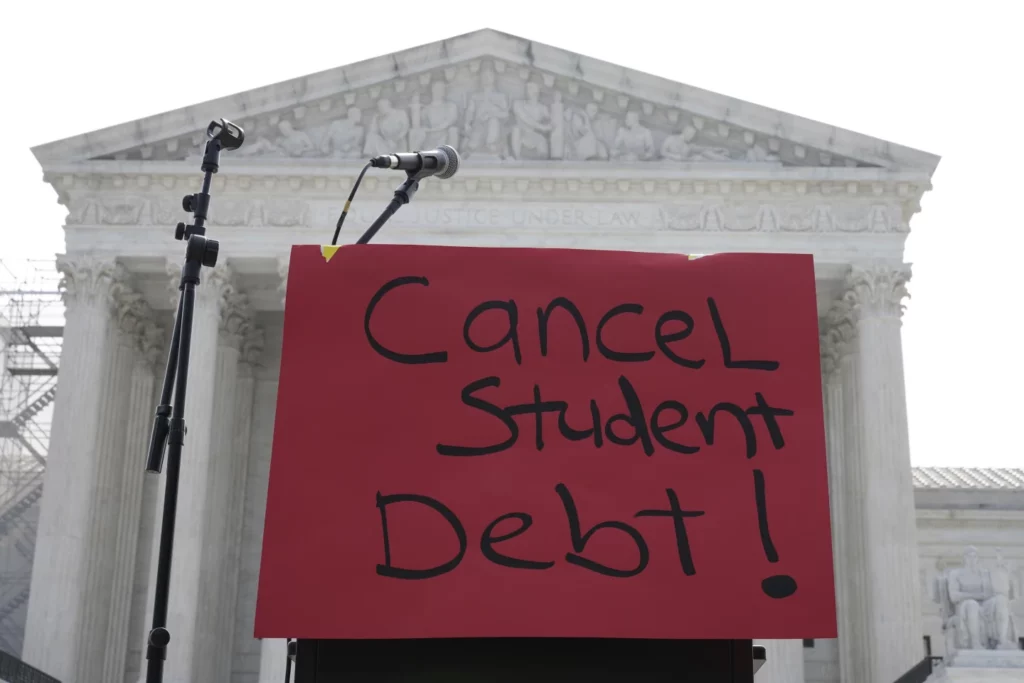
A sharply divided Supreme Court ruled Friday that the Biden administration overstepped its authority in trying to cancel or reduce student loans for millions of Americans. The 6-3 decision, with conservative justices in the majority, effectively killed the $400 billion plan, announced by President Joe Biden last year, and left borrowers on the hook for repayments that are expected to resume by late summer. The court held that the administration needs Congress’ endorsement before undertaking so costly a program. The majority rejected arguments that a bipartisan 2003 law dealing with student loans provided the authority Biden claimed. Republished with the permission of The Associated Press.
The Supreme Court rules for a designer who doesn’t want to make wedding websites for gay couples
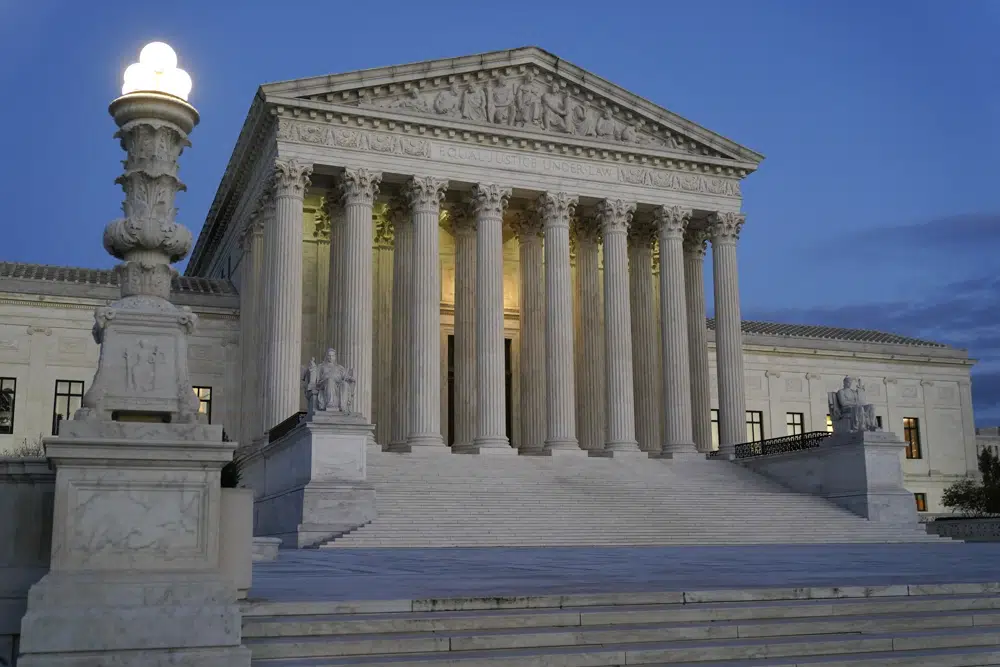
In a defeat for gay rights, the Supreme Court’s conservative majority ruled Friday that a Christian graphic artist who wants to design wedding websites can refuse to work with same-sex couples. The court ruled 6-3 for designer Lorie Smith despite a Colorado law that bars discrimination based on sexual orientation, race, gender, and other characteristics. Smith had argued that the law violates her free speech rights. Smith’s opponents warned that a win for her would allow a range of businesses to discriminate, refusing to serve Black, Jewish, or Muslim customers, interracial or interfaith couples, or immigrants. But Smith and her supporters had said that a ruling against her would force artists — from painters and photographers to writers and musicians — to do work that is against their beliefs. “The First Amendment envisions the United States as a rich and complex place where all persons are free to think and speak as they wish, not as the government demands,” Justice Neil Gorsuch wrote for the court’s six conservative justices. Justice Sonia Sotomayor wrote a dissent that was joined by the court’s other liberals. “Today, the Court, for the first time in its history, grants a business open to the public a constitutional right to refuse to serve members of a protected class,” Sotomayor wrote. The decision is a win for religious rights and one in a series of cases in recent years in which the justices have sided with religious plaintiffs. Last year, for example, the court ruled along ideological lines for a football coach who prayed on the field at his public high school after games. The decision is also a retreat on gay rights for the court. For two decades, the court has expanded the rights of LGBTQ people, most notably giving same-sex couples the right to marry in 2015 and announcing five years later that a landmark civil rights law also protects gay, lesbian, and transgender people from employment discrimination. That civil rights law decision was also written by Gorsuch. Even as it has expanded gay rights, however, the court has been careful to say those with differing religious views needed to be respected. The belief that marriage can only be between one man and one woman is an idea that “long has been held — and continues to be held — in good faith by reasonable and sincere people here and throughout the world,” Justice Anthony Kennedy wrote in the court’s gay marriage decision. The court returned to that idea five years ago when it was confronted with the case of a Christian baker who objected to designing a cake for a same-sex wedding. The court issued a limited ruling in favor of the baker, Jack Phillips, saying there had been impermissible hostility toward his religious views in the consideration of his case. Phillips’ lawyer, Kristen Waggoner, of the Alliance Defending Freedom, also brought the most recent case to the court. Smith, who owns a Colorado design business called 303 Creative, does not currently create wedding websites. She has said that she wants to but that her Christian faith would prevent her from creating websites celebrating same-sex marriages. And that’s where she runs into conflict with state law. Colorado, like most other states, has a law forbidding businesses open to the public from discriminating against customers. Colorado said that under its so-called public accommodations law, if Smith offers wedding websites to the public, she must provide them to all customers, regardless of sexual orientation. Businesses that violate the law can be fined, among other things. Smith argued that applying the law to her violates her First Amendment rights. The state disagreed. The case is 303 Creative LLC v. Elenis, 21-476. Republished with the permission of The Associated Press.
Red snapper season continues through July 4

On Thursday, the Marine Resources Division (MRD) of the Alabama Department of Conservation and Natural Resources (ADCNR) reminded Alabamians that state waters and federal waters will be open to private and state-licensed charter vessel anglers for red snapper harvest on Tuesday, July 4, 2023. Scott Bannon is the Director of the Marine Resources Division. “The Fourth of July is traditionally a day when families spend time together on the water,” said MRD Director. “We are thankful to be in a position to provide the opportunity for people to catch red snapper this Independence Day. A closing date for the season will be announced when the 2023 quota is anticipated to be met. Anglers are encouraged to continue reporting their harvest through Snapper Check and participate in the dockside surveys conducted by MRD staff. Accurate reporting helps us best manage Alabama’s red snapper season.” Every fisherman is required to report any red snapper to ADCNR through the Snapper Check system. This includes shore, private vessels, and state charter angler landings. Red snapper landings updates are posted weekly during the season on ADCNR’s Red snapper page. As of June 26, 2023, anglers have already harvested 361,314 pounds of the state’s 2023 federal quota of 591,185 pounds. Fishermen have less than 130,000 pounds to harvest before government authorities will have to shut red snapper fishing down for the remainder of the year. Alabama anglers have harvested 130,000 pounds of red snapper in just the last 17 days – well ahead of last year’s pace, where the quota was never reached. If this is a big fishing week, red snapper harvesting could likely be shut down before the middle of July. The Alabama private angler quota for 2023 was set by the Biden Administration’s National Oceanic and Atmospheric Administration (NOAA) Fisheries division. The dramatically lower red snapper quota is a result of changes concerning the difference between state and federal harvest landing systems. The Marine Resources Division hopes that there will be an increase to Alabama’s 2024 red snapper quota due to an increase in the annual catch limit for Gulf red snapper that is currently in the rulemaking process at NOAA Fisheries. Chris Blankenship is the Commissioner of ADCNR. “Even with the changes to Alabama’s quota this year, we are having a great red snapper season,” said Commissioner Blankenship. “Adding the Fourth of July holiday for red snapper fishing will be good for families and friends celebrating our freedoms on the water that day in coastal Alabama.” Anglers are reminded that the daily bag limit is two red snapper per person, per day, with a minimum size limit of 16 inches in total length. To take any fish beyond the two-fish limit or any red snapper smaller than 16 inches is strictly illegal. To lawfully fish for red snapper – or any other saltwater fish – you must have a valid Alabama Saltwater Fishing License. Anglers have numerous fish that they may legally harvest in state and federal waters if the red snapper limit is reached. NOAA is holding a meeting of the Gulf of Mexico Fishery Management Council on August 14 – 17 in Austin, Texas. The Council will be in Gulf State Park in Gulf Shores, Alabama, on April 8 – 11. To connect with the author of this story or to comment, email brandonmreporter@gmail.com.
Steve Marshall says Supreme Court decision does away with all “governmentally imposed discrimination based on race”

On Thursday, Alabama Attorney General Steve Marshall issued a statement today following the landmark U.S. Supreme Court ruling in Students for Fair Admissions, Inc. v. President and Fellows of Harvard College. In a 6-3 decision written by Chief Justice John Roberts, the majority’s opinion held that racial discrimination in university admissions violates the Constitution’s prohibition on governmental discrimination based on race. “This landmark decision makes clear ‘the core purpose of the Equal Protection Clause: doing away with all governmentally imposed discrimination based on race,” Marshall stated. “Ivy League appeals to diversity do not justify discriminating against prospective students based on the color of their skin.” In May 2022, Attorney General Marshall joined a coalition of 19 states supporting the challengers’ cases before the Supreme Court. The brief decried Harvard’s and the University of North Carolina at Chapel Hill’s discrimination against Asian-American applicants. The conservative AGs argued that racial discrimination in admissions is unnecessary to ensure applicants have a fair shot at obtaining quality higher education. The Biden Department of Justice supported both Universities in their vigorous defense of their admissions policies. Thursday’s ruling was a defeat for the Biden Administration. “Today, the Court once again walked away from decades of precedent and made — as the dissent has made clear,” said President Joe Biden. “The dissent states that today’s decision, quote, ‘rolls back decades of precedent and momentous progress.’ End of quote. I agree with that statement from the dissents — from the dissent.” “The Court has effectively ended affirmative action in college admissions,” Biden continued. “And I strongly — strongly disagree with the Court’s decision.” “We all know it: Discrimination still exists in America. Discrimination still exists in America. Discrimination still exists in America,” Biden stated. “Today’s decision does not change that. It’s a simple fact. If a student has — has overcome — had to overcome adversity on their path to education, a college should recognize and value that. Our nation’s colleges and universities should be engines of expanding opportunity through upward mobility. But today, too often, that’s not the case.” Biden continued, “Colleges and universities should continue their commitment to support, retain, and graduate diverse students and classes. We can’t go backwards. You know, I know today’s Court decision is a severe disappointment to so many people, including me, but we cannot let the decision be a permanent setback for the country. We need to keep an open door of opportunities. We need to remember that diversity is our strength. We have to find a way forward. We need to remember that the promise of America is big enough for everyone to succeed.” Biden was asked by a reporter, “President Biden, the Congressional Black Caucus said the Supreme Court has “thrown into question its own legitimacy.” Is this a rogue Court?” “This is not a normal Court,” Biden responded. To connect with the author of this story or to comment, email brandonmreporter@gmail.com.
Florida agency appeals ruling blocking anti-drag show law
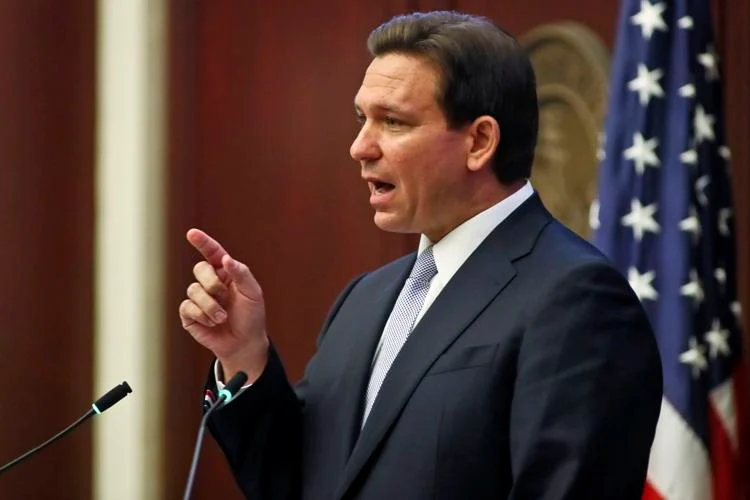
Days after a federal judge temporarily blocked a new Florida law targeting drag shows, the state has appealed that decision. The Florida agency that regulates businesses asked the judge who ruled against it last week to allow the law’s enforcement while its appeal is pending before the U.S. Court of Appeals for the Eleventh Circuit. The request was made Wednesday in federal court in Orlando. U.S. District Judge Gregory Presnell last week granted a preliminary injunction — stopping the law from being enforced until a trial is held to determine its constitutionality — and he denied the state agency’s request to dismiss it. Attorneys for the Florida Department of Business and Professional Regulation asked that the injunction only apply to the business that challenged the law, saying that the judge’s injunction “sweeps beyond Plaintiff to nonparties who may wish to expose children to live obscene performances in violation of the statute.” The complaint was brought by the owner of a Hamburger Mary’s restaurant and bar in Orlando, which regularly hosts drag shows, including family-friendly performances on Sundays that children were invited to attend. The restaurant owner said the law was overbroad, was written vaguely, and violated First Amendment rights by chilling speech. The new law, championed by Republican Gov. Ron DeSantis, punished venues for allowing children into “adult live performances.” Though it did not mention drag shows specifically, the sponsor of the legislation said it was aimed at those performances. Venues that violated the law faced fines and the possibility of their liquor licenses being suspended or revoked. Individuals could be charged with a misdemeanor crime. Ahead of announcing a run for the 2024 GOP presidential nomination this spring, DeSantis made anti-LGBTQ+ legislation a large part of his agenda as governor. Other bills he signed would ban gender-affirming care for minors and restrict discussion of personal pronouns in schools. Republished with the permission of The Associated Press.
Republicans expand their Hunter Biden investigation by seeking an interview with the lead prosecutor
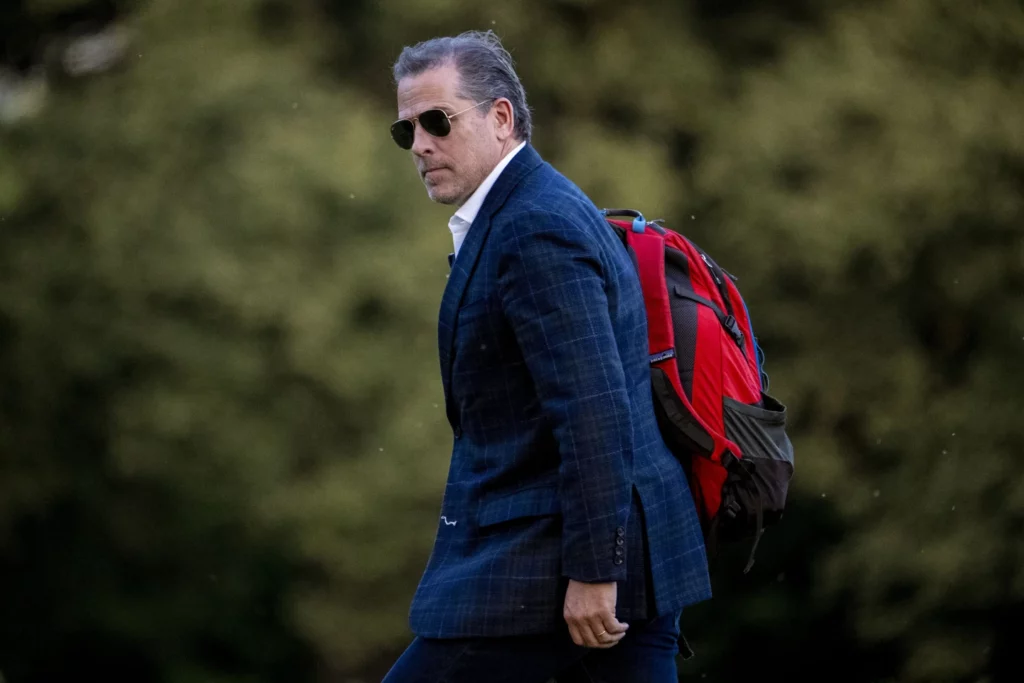
House Republicans on Thursday requested voluntary testimony from nearly a dozen Justice Department officials involved in the investigation of President Joe Biden’s son Hunter Biden as GOP lawmakers widen their scrutiny into what they claim is improper interference by the agency. Leaders of the Republican-controlled House Judiciary, Oversight and Accountability, and Ways and Means committees asked in a letter to Attorney General Merrick Garland for nine officials from the Justice Department and two from the FBI to appear for the interviews to address recent allegations made by two IRS employees who worked on the federal investigation into Hunter Biden’s taxes and foreign business dealings. “Recent startling testimony from Internal Revenue Services whistleblowers raises serious questions about the Department’s commitment to evenhanded justice and the veracity of assertions made to the Committee on the Judiciary,” Reps. Jim Jordan of Ohio, James Comer of Kentucky, and Jason Smith of Missouri wrote in the letter obtained by The Associated Press. The individuals named in the letter include David Weiss, the U.S. attorney in Delaware in charge of the investigation, as well Assistant U.S. Attorney Lesley Wolf of Delaware and the top federal prosecutor for the District of Columbia Matthew Graves. Garland said last week that the Justice Department will not object to Weiss testifying to Congress. A department spokesperson confirmed receipt of the letter but declined further comment. The request comes about a week after Biden, 53, reached an agreement with the government to plead guilty to misdemeanor tax offenses. The plea deal would also avert prosecution on a felony charge of illegally possessing a firearm as a drug user, as long as Biden adheres to conditions agreed to in court. Days later, the House Ways and Means Committee, led by Smith, voted to publicly disclose congressional testimony from the IRS employees. The testimony from Greg Shapley and an unidentified agent detailed what they called a pattern of “slow-walking investigative steps” and delaying enforcement actions in the months before the 2020 election won by Joe Biden. It is unclear whether the conflict they describe amounts to internal disagreement about how to pursue the investigation or a pattern of interference and preferential treatment. Department policy has long warned prosecutors to take care in charging cases with potential political overtones around the time of an election, to avoid influencing the outcome. The Justice Department has denied the claims and said Weiss, appointed to his job when Donald Trump was president, had full authority over the case. The letter provided a deadline of July 13 for the department to begin scheduling the individuals for transcribed interviews. It said that if the deadline is not met, the committee chairmen will resort to using a congressional subpoena to force cooperation. Beyond Hunter Biden, the House Oversight and Accountability Committee led by Comer has undertaken a broader review of the Biden family’s finances and foreign dealings, issuing dozens of subpoenas to business associates and financial institutions. Republicans have focused much attention on an unverified tip to the FBI that alleged a bribery scheme involving Joe Biden when he was vice president. The unsubstantiated claim, which first emerged in 2019, was that Biden pressured Ukraine to fire its top prosecutor in order to stop an investigation into Burisma, an oil-and-gas company where Hunter Biden was on the board. Democrats said in a letter Thursday to Comer that the Justice Department investigated the claim when Trump was president and closed the matter after eight months, finding “insufficient evidence” that it was true. Democrats highlighted the transcript of an interview with Mykola Zlochevsky, Burisma’s co-founder, in which he denied having any contact with Joe Biden while Hunter Biden worked for the company. “Mr. Zlochevsky’s statements are just one of the many that have debunked the corruption allegations,” said the committee’s top Democrat, Maryland Rep. Jamie Raskin. Republished with the permission of The Associated Press.
Florida law enforcement shuts down fentanyl, xylazine trafficking ring

Florida law enforcement officers and Attorney General Ashley Moody’s Office of Statewide Prosecution have shut down a trafficking ring in the Orlando area. The group is responsible for pushing large quantities of narcotics, including fentanyl laced with xylazine, into the area. Moody’s prosecution team is scheduled to prosecute 12 people on drug trafficking charges who are accused of trafficking cocaine, fentanyl, xylazine, and amphetamine in the Orlando area. In April, Moody launched a public safety alert warning about the dangers of Xylazine, an animal tranquilizer, referred to as “Tranq” on the streets. Tranq has been found to be laced in fentanyl and other drugs that have led to overdoses and deaths. In two years, the frequency with which the drug has been identified in FDLE crime labs has doubled, The Center Square previously reported. “I have been warning about the presence and proliferation of the zombie drug xylazine being mixed with already deadly fentanyl for months now,” Moody said. “This extremely dangerous and flesh-eating drug is outlawed in Florida, and we will aggressively prosecute any criminal organization trafficking this poison across judicial circuits in our state. I am grateful for our dedicated law enforcement partners for shutting down this ring and cutting off this lethal supply chain.” Moody’s office is prosecuting individuals arrested by Florida law enforcement officers. The Orange County Sheriff’s Office began an investigation after it received information from various informants about a drug trafficking organization operating throughout the Oak Ridge area of Orange County. Members of the sheriff’s narcotics unit conducted multiple controlled purchases from several members of the alleged trafficking group of fentanyl laced with xylazine, and cocaine. Their investigation also uncovered that the drugs were being transported to Florida from a supplier in New Jersey. The Florida Highway Patrol then began to intercept members of the group in Volusia County. In one stop, they seized over 400 grams of fentanyl and xylazine in the trunk of a vehicle. Throughout the multi-agency investigation, the alleged drug traffickers “committed several other crimes, including conspiracy to traffic fentanyl greater than 28 grams, trafficking amphetamine greater than 28 grams, money laundering, multiple sales and deliveries, conspiracies to sell and deliver,” according to a statement from Moody’s office. Twelve people were arrested, a majority of whom are men. They were charged with a combined 52 felony counts ranging from money laundering and possession of cocaine to conspiracy to traffic fentanyl, which carries a 25-year mandatory minimum prison sentence. Moody’s Assistant Statewide Prosecutor Ashley Wright is prosecuting the cases. Moody and Florida law enforcement officials are still warning about the dangers of fentanyl, xylazine, and other illicit drugs. Xylazine is now the sixth-most identifiable illicit drug in Florida, according to the Florida Department of Law Enforcement. Moody also sent a letter to DEA Administrator Anne Milgram calling on her to add Xylazine to the list of controlled substances. Xylazine is already a Schedule I substance in Florida. Republished with the permission of The Center Square.

